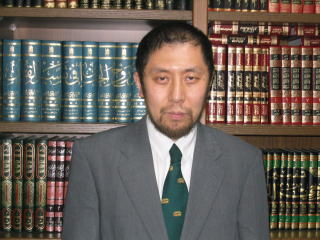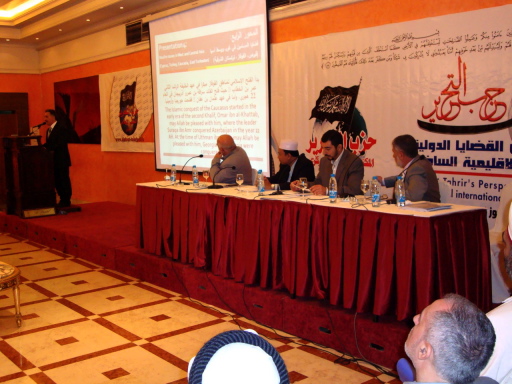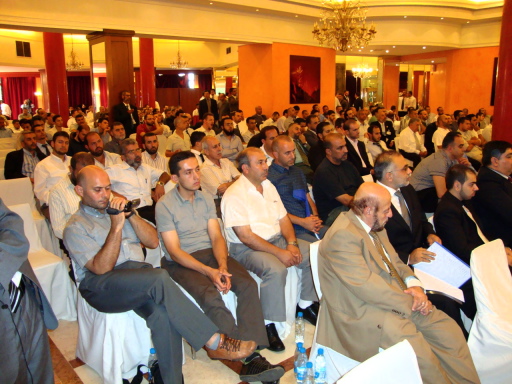Islam in Japan - An Interview with Professor Hassan Ko Nakata

7 Aug 2010
There are believed to be around 100,000 Muslims in Japan. Most of these are immigrants, the biggest group being comprised of Indonesians who number around 30,000. Ethnic Japanese converts are very few. In this interview with Mahan Abedin, Hassan Ko Nakata provides an overview on Islam in Japan and also comments on the concept of Khilafa (Caliphate).
7 Aug 2010
There are believed to be around 100,000 Muslims in Japan. Most of these are immigrants, the biggest group being comprised of Indonesians who number around 30,000. Ethnic Japanese converts are very few. In this interview with Mahan Abedin, Hassan Ko Nakata provides an overview on Islam in Japan and also comments on the concept of Khilafa (Caliphate).
 |
| Professor Hassan Ko Nakata |
In the past thirty years Ko Nakata has had a rich and diverse academic career. He completed his PhD in Islamic Philosophy at Cairo University in 1992-1996. In 2003 he joined the Faculty of Theology at Doshisha University. He was the deputy director of the Centre for Interdisciplinary Studies for Monotheistic Religions at Doshisha University from 2003-2008.
He has published many academic texts, foremost “Wilayat Al-Faqih, Sovereignty and Constitution: Political Theories in Post-Khomeini Iran” (2000); "The Interplay between Islam and Civilization: the Case of East Asia” (2002); “The Concept of Khilafa: Spreading the Rule of Law all over the World” (2010).
Ko Nakata is also a community activist and sits on the board of directors of the Japan Muslim Association.
This interview was conducted in Beirut on the 20th of July 2010, on the fringes of the international Islamic party Hizbut Tahrir's annual “Khilafa” conference. The conference was attended by several hundred delegates and was addressed by HT leaders and leading Islamic activists and thinkers from around the world.
Mahan Abedin - When did you convert to Islam and why?
Hassan Ko Nakata - It was thirty years ago when I was studying at the department of Islamic studies.
Mahan Abedin - We know very little about Muslims in Japan. Foremost, we'd like to know about their demographic strength.
Hassan Ko Nakata - We have no official statistics but there are believed to be around 100,000 Muslims in Japan. Most of these are immigrants, the biggest group being comprised of Indonesians who number around 30,000, then Pakistanis, Bangladeshis and Iranians.
Mahan Abedin - How many ethnic Japanese have converted to Islam?
Hassan Ko Nakata - Very few, not more than 7,000. And most of them are Japanese women who have married foreign Muslim men. Genuine converts like me are very few in number.
Mahan Abedin - How many are we talking about, several hundred perhaps?
Hassan Ko Nakata - I would say there are less than one hundred.
Mahan Abedin - You have previously said that one of the reasons you decided to become a Muslim was the influence of the Islamic Revolution in Iran in 1979. Please expand on this.
Hassan Ko Nakata - I was interested in religion in general. When I entered Tokyo University in 1979, I became a member of the Bible Study Circle and studied the history of Christianity and Judaism. The Iranian Revolution impressed upon me the fact that Islam is the most active religion in the world. That is why I became very interested in studying it more deeply.
Mahan Abedin - How has Islam enriched your life?
Hassan Ko Nakata - My case is obviously unique since I am one of a very few ethnic Japanese who have converted to Islam, and moreover I have managed to get a job as a professor of Islamic studies which allows me to practice Islamic obligations like the daily Prayer (Salah) freely. It has been an interesting experience since Islam is totally contradictory to the Japanese way of life.
Mahan Abedin - What difficulties and prejudices have you faced in Japanese society?
Hassan Ko Nakata - The problem is not prejudice but practical issues such as finding a place to conduct Vozoo (ablution before praying) and Prayer (Salah).
Mahan Abedin - So unlike the West there is no explicit prejudice against Muslims in Japan?
Hassan Ko Nakata - No, there is not.
Mahan Abedin - For instance, in the West an increasing number of people associate Islam with negative events and trends such as terrorism and conflict; in Japan people don't make this conscious association?
Hassan Ko Nakata - No, they don't care. They have no concept of these things. It is not just with Islam, but any other religion.
Mahan Abedin - As a Muslim, what is your view of Japan's modern history? For example, do you share the majority's feeling of shame about Japan's role during the Second World War?
Hassan Ko Nakata - Of course, I don't like the then ruling military regime. But the Japanese state and society at the time had a far better understanding of Islam than the contemporary generations. One reason is that Shinto was then the state religion, but like Islam, Shinto is not a religion in the Western sense of the word. Shinto was regarded more as a way of life by the Japanese nation than a religion in the Western sense. This enabled the former Japanese regime to claim that all the inhabitants of Japan enjoyed freedom of religion in the Western sense whilst at the same time respecting the customs of Shinto. Actually, the Japanese have never seen any contradiction in adopting Shinto and Buddhist beliefs and customs simultaneously.
Mahan Abedin - What about the former Japanese regime's ambition to play a greater role in Asia and displace the United Kingdom as the dominant power in that region of the world? Do you feel any sympathy toward that geopolitical objective?
Hassan Ko Nakata - Whilst I sympathise with the goal of freeing Asian people from Western domination, I don't believe the former military regime's goals were purely idealistic.
Mahan Abedin - In other words they wanted to replace Western domination with Japanese supremacy?
Hassan Ko Nakata - Something similar perhaps.
Mahan Abedin - When was the Japan Muslim Association (JMA) established?
Hassan Ko Nakata - It was established in 1952 by Japanese converts to Islam. It is the oldest Islamic organisation in Japan.
Mahan Abedin - What is the primary function of the JMA?
Hassan Ko Nakata - Its primary goal is to safeguard Japanese Islamic identity.
Mahan Abedin - What about its practical work?
Hassan Ko Nakata - We maintain Muslim cemeteries, publish translations on the meaning of the Holy Qur`an, produce journals and generally publish and disseminate material on Islamic issues.
Mahan Abedin - Who is the President of the JMA?
Hassan Ko Nakata - It is Sheikh Amin Tokomasu. He is Japanese and a graduate of Al-Azhar University.
Mahan Abedin - Are there sizeable Shia Muslim and Sufi communities in Japan?
Hassan Ko Nakata - There is a sizeable Iranian community in Japan but generally speaking Iranians are not very religious, especially in foreign settings. But we have one Japanese Shia Mujtahid, Hojatoleslam Ibrahim Sawada, who is an alumni of the Qom seminaries. He works at the Iranian Embassy in Tokyo.
Mahan Abedin - How many genuine ethnic Japanese Shias are there?
Hassan Ko Nakata - I think you can count them with your fingers! But bear in mind that the biggest group of so-called ethnic Japanese converts to Islam are Japanese women who have married Iranian men. Therefore, in that sense Shias constitute a sizeable community in Japanese Islam. For example, the most popular Japanese baseball player Darvish Yu is considered a Shia Muslim by virtue of having an Iranian father.
Mahan Abedin - What about Sufis?
Hassan Ko Nakata - There are individual Sufis but there is no noteworthy organisational presence in the form of Sufi orders.
Mahan Abedin - Have Japanese Muslims developed a political consciousness similar to that of Western Muslims?
Hassan Ko Nakata - Not at all! Japanese Muslims tend to view their faith as a private matter. They haven't had the opportunity to appreciate the broader dimensions of Islam.
Mahan Abedin - Does Hizbut Tahrir (HT) have a presence in Japan?
Hassan Ko Nakata - They don't have any local activity, but there are about five Indonesians in Japan who are members of HT.
Mahan Abedin - Is it correct to describe you as an HT sympathiser?
Hassan Ko Nakata - Yes but I am not a member of HT and am not in any way officially or formally connected to them.
Mahan Abedin - What makes HT different to other Islamic groups?
Hassan Ko Nakata - I find that HT is the only real international political Islamic movement. Tablighi Jamaat is also international but the key difference is they don't espouse overtly political objectives.
 |
| A lecture at the Hizbut Tahrir's conference in Lebanon, where Mahan Abedin interviewed Prof. Ko Nakata. |
Mahan Abedin - The concept of “Khilafa” looms large in all your writings. How realistic is the political goal of re-establishing the Islamic Caliphate?
Hassan Ko Nakata - I don't care if it is realistic or not. It is realistic insofar as it is obligatory on Muslims to strive to create and safeguard the Khilafa. I believe the Khilafa is the ideal system for all mankind. The term Khilafa is not that important, as according to Islamic Fiqh (jurisprudence) the ideal system is referred to as the Imamah (not to be confused with Shia Imamology). Khilafa is merely the political expression of the universality of Islam, and the movement for the reestablishment of Khilafah is the true globalization force with Islamic justice as the alternative to the so called false globalization made in America.
Mahan Abedin - As a Japanese Muslim, do you have the same concerns and grievances as Muslims living in the heartlands of Islam in the Middle East and South-East Asia, namely the occupation of Palestinian lands by Israel and Western foreign policy, as manifested by the military interventions in Iraq and Afghanistan?
Hassan Ko Nakata - We should not be overly concerned with these matters. Our greatest priority should be inner reform, and not criticising others.
Mahan Abedin - What do you mean by inner reform?
Hassan Ko Nakata - I mean the establishment of the Khilafa. Most Westerners have completely the wrong idea about Khilafa insofar as they equate it with a dictatorial and even totalitarian centralised political system. But this is totally wrong since Khilafa is foremost the rule of law not rule by law. It is akin to English Common Law, insofar as it is not enacted by parliament but instead flows from the age-old customs and traditions of a distinct people. Strictly speaking, Shariahis the oldest and most consistent system of law in the world. I believe Islamic law or Shariah is the only system that could be fairly described as the rule of law.
Mahan Abedin - In your writings you claim that Khilafa is synonymous with Imamah Kubra (Great Imamate). How is it synonymous and at what point does Khiafa diverge (at a symbolic and rhetorical level at least) from Imamah Kubra?
Hassan Ko Nakata - In Fiqh (Islamic jurisprudence) and Usuluddin (fundamentals of the religion), the term Imamah (Kubra) is used for ri'asah `ammah li-shu'un al-din wa al-dunya (the supreme leadership for the affairs of religion and this world) which is the real meaning of the term Khilafah. Traditionally the term Khilafah is not treated under Fiqh and Usuluddin and is used more as a historical reference point.
Mahan Abedin - You claim that the Khilafa regime is "secular". How does your definition of secularism differ from prevailing Western definitions?
Hassan Ko Nakata - The Khilafah system is not authorised to interfere in people's rituals, faiths and other private matters. In that sense it is “secular”, at least in the Western definition of the term.
Mahan Abedin - How do you understand and interpret the difference between "common" law and "religious" law in the Shariah?
Hassan Ko Nakata - In principle Islamic "common” law is applied to all the inhabitants of Dar al-Islam (Abode of Islam) regardless of their religious affiliation, but Islamic "religious” law is applied only to Muslims and non-Muslims are not required to relinquish their religious autonomy.
Mahan Abedin - In your writings you are keen to draw an analogy between English Common Law and the Islamic Shariah. Please explain the connection.
Hassan Ko Nakata - There is strong evidence that the supremacy of law was developed by Islamic jurists before the twelfth century, inasmuch as no official could claim to be above the law, not even the Khalifah (Caliph).
Compared to Islamic law, only the Common Law of England has some limited stability, but “the rule of law” was established only in the 17th century thanks to the efforts of Lord Chief Justice Edward Coke (d. 1634) and the like, and it continued to evolve until the courts of law and equity were combined in 1873 and 1875 thereby completing the current features of the common law.
Even this English Common Law is said to be influenced by Islamic Law through the Norman conquest of England. Previously, the Normans had conquered and inherited the Islamic legal administration of the Emirate of Sicily. This connection was highlighted by the legal scholar John Makdisi in his "The Islamic Origins of the Common Law" (Makdisi, John A. (1999), North Carolina Law Review 77).
Mahan Abedin - You write that the "abolishment [sic] of borders which hinder the movement of the people is the indispensable essential part of [the] Islamic order". Are you calling for a global Islamic state?
Hassan Ko Nakata - Yes, Islamic law and traditions reject the notion of a territorially-bound nation-state.
Mahan Abedin - You claim your concept and definition of Khilafa is "totally" different to HT's, but your statement appears to contradict your claims. How does your definition of Khilafa differ from HT's?
Hassan Ko Nakata - I think HT's concept of Khilafah is too centralized and is similar to the systems that prevailed under communism. In my opinion, Khilafah is more akin to an anarchical regime. But this is not a matter of Fiqh, so we need a totally new intellectual framework to discuss the issue in a deep and meaningful manner.
 |
| The audience during one of the sessions of Hizbut Tahrir's conference in Beirut. |
Tiada ulasan:
Catat Ulasan